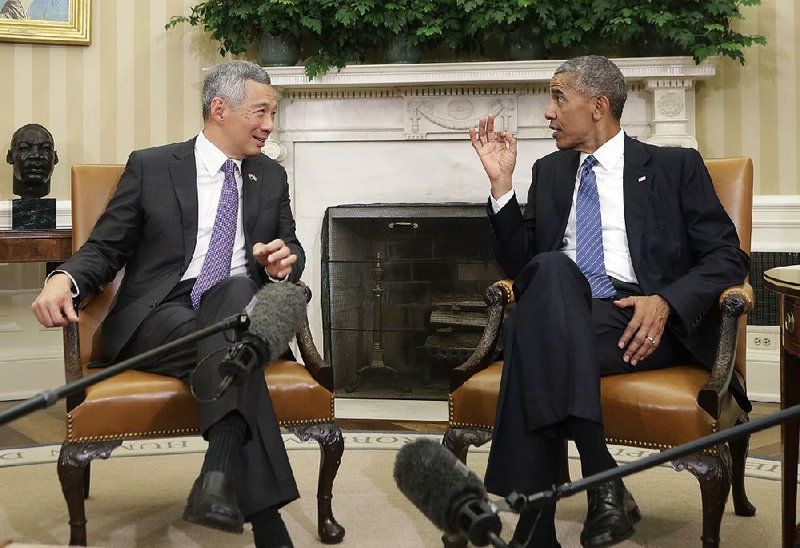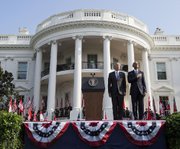WASHINGTON -- President Barack Obama found common cause with the leader of Singapore in the face of growing political headwinds against the Trans-Pacific Partnership, warning that to "pull up a drawbridge" on trade would only hurt the United States and its workers.
Singaporean Prime Minister Lee Hsien Loong urged the United States to maintain its "indispensable role" in the Asia-Pacific and ratify the trade deal, as he joined Obama at the White House to celebrate the 50th anniversary of U.S. diplomatic relations with the Southeast Asian city-state.
Obama said people have legitimate fears about the effect of globalization and being "left behind," but the answer cannot be to back away from trade and the global economy.
"It is here to stay. It is not possible to cut ourselves off," Obama said at a joint news conference after talks with Lee in the Oval Office. "To try to pull up a drawbridge on trade would only hurt us and hurt our workers. The answer is to make sure that globalization and trade is working for us and not against us."
"TPP is designed to do precisely that," Obama added, using an abbreviation for the trade deal.
Obama said the deal would also create enforceable labor and environmental rules, enabling countries party to the agreement to better police undesirable activities such as human trafficking, wildlife poaching, illegal fishing, child labor and deforestation.
"It gives us leverage to promote things that progressives and people here in this country, including labor unions, say they care about," Obama said.
Singapore, a close U.S. partner, is one of the 12 nations in the trade pact. But Lee's Washington visit comes as opposition to it intensifies among political leaders in the United States. The two major nominees to replace Obama, Republican Donald Trump and Democrat Hillary Clinton, are both against it.
Asked about that opposition, Obama responded: "Right now I'm president and I'm for it, and I think I have the better argument."
Lee, in his remarks, described the U.S. as a longtime stabilizing influence in the Asia-Pacific and said it has put its reputation on the line over the Trans-Pacific Partnership. He said other nations such as close U.S. ally Japan have faced political costs at home to make the deal.
"If at the end, waiting at the altar the bride doesn't arrive, I think there are people who are going to feel really hurt, not just emotionally, but really damaged for a long time to come," Lee said, adding that it could undermine confidence in the U.S. as a security partner.
Obama expressed confidence that his administration could win congressional approval for the Trans-Pacific Partnership before his term ends. He said he was ready to sit down publicly with lawmakers to go through its provisions to address "misinformation" about the agreement.
"I've got some very close friends, people I admire a lot, but I just disagree with them," Obama said. "That's OK. I respect the arguments they're making. They come from a sincere concern about the position of workers and wages in this country."
Clinton helped negotiate the deal as Obama's first secretary of state but disavowed the completed agreement during her primary presidential run against Sen. Bernie Sanders of Vermont, a long-time opponent of the pact. Sanders earned loud applause during his Democratic convention speech last week when he said Democrats should seek to block any effort to bring up the deal in Congress.
Republican lawmakers have shown little appetite for holding a vote on the deal, which Trump routinely belittles on the campaign trail as bad for American workers. Last month, Senate Majority Leader Mitch McConnell, R-Ky., appraised the odds for the deal this year as "pretty slim."
On Tuesday, six House Republicans who had supported legislation last year reversed their support, urging Obama in a letter not to send the trade accord to Congress for a vote this year. The letter was signed by Reps. Candace Miller and Dave Trott of Michigan, Bill Shuster and Tim Murphy of Pennsylvania, Ed Whitfield of Kentucky, and Ted Yoho of Florida.
The members called on the administration to reopen negotiations on the 12-nation accord and add language that specifically bars member nations from manipulating their currency. The White House has objected to such provisions because trade pacts are not typically used to set monetary policy and other countries could try to use the deal to influence decisions by the U.S. Treasury and Federal Reserve.
"A 'lame duck' Congress should not vote on an agreement of this consequence -- it would be an end-run around the American people immediately following an election," the members wrote.
Obama said he knew the politics of the deal were difficult but that he remained optimistic he could make his case after the election.
"Hopefully after the election is over and the dust settles, there will be more attention" to the actual facts of the deal, Obama said.
The World Bank says the deal, which would be the biggest U.S. trade agreement since the 1994 North American Free Trade Agreement, could raise gross domestic product by an average of 1.1 percent in member countries by 2030. The pact goes beyond typical trade agreements, which focus mostly on reducing tariffs, by highlighting stricter safeguards for patents and leveling the playing field for companies that compete with government-backed businesses.
The deal would eliminate trade barriers and tariffs, streamline standards, and encourage investment between the 12 countries -- including Mexico, Japan, Vietnam and Australia -- that account for about 40 percent of global economic output. But critics say the pact undercuts U.S. workers by introducing lower-wage competition and gives huge corporations too much leeway.
Singapore, a city-state of 5.7 million people, is heavily dependent on international trade for its prosperity. In 2004, it became the first Asian nation to strike a bilateral free-trade agreement with the U.S. Last year, the bilateral trade in goods totaled $47 billion, with the U.S. enjoying a $10 billion surplus.
Obama said the U.S. and Singapore shared a "common vision of a peaceful and prosperous Asia-Pacific and a more secure world." He paid tribute to the tiny nation's transformation from third-world country to a first-world country, saying it "punches above its weight."
The U.S. and Singapore opened diplomatic relations in 1966, a year after the U.S. recognized Singapore's independence from Malaysia.
The state dinner for Lee was the first held for a Singaporean leader since October 1985, when Ronald Reagan hosted Lee's father, Prime Minister Lee Kuan Yew.
Information for this article was contributed by Josh Lederman and Matthew Pennington of The Associated Press; by Justin Sink, David Roman and Toluse Olorunnipa of Bloomberg News; and by David Nakamura of The Washington Post.
A Section on 08/03/2016

